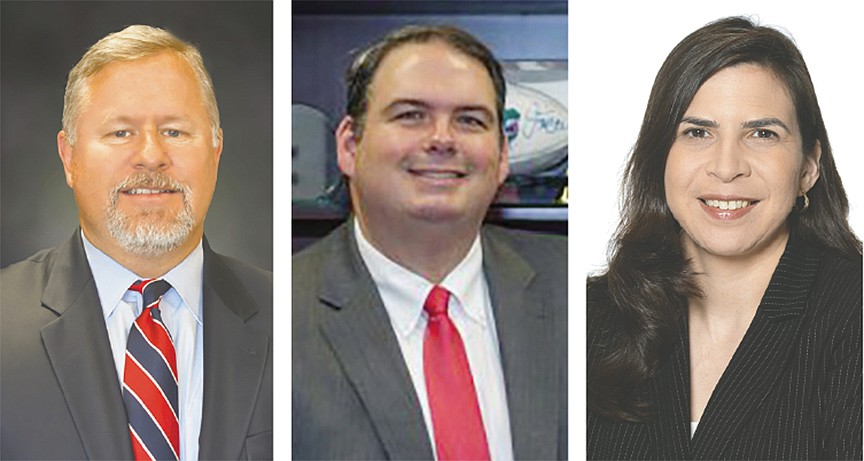
Jacksonville could increase its presence on the 1st District Court of Appeal in Tallahassee with the nomination of a 4th Circuit judge and two local attorneys for possible appointment to two vacancies on North Florida’s 32-county appellate court.
The vacancies were created by the resignations of Judges Allen Winsor and T. Kent Wetherell II, who were appointed to the federal court by President Donald Trump.
Nominee Gilbert Feltel Jr. is an assistant city general counsel and chief legal counsel to the Jacksonville Port Authority.
Florida Bar board certified in business litigation, he was formerly a partner with the Tanner Bishop law firm and chair of the 4th Circuit Judicial Nominating Commission.
A 1993 graduate of the University of Florida Levin College of Law, Feltel began his career as an assistant state attorney in Jacksonville. He later was with the Rogers Towers law firm, director of legal services for The First Tee Inc. and an assistant general counsel at CSX Corp.
Eric Roberson was appointed judge in the 4th Judicial Circuit in 2017 after two years on the Duval County Court bench.
A native of Jacksonville, he graduated from the University of Florida Levin College of Law and was admitted to The Florida Bar in 2005.
Roberson began his career as an assistant state attorney in Jacksonville. In 2007 he joined the McGuireWoods law firm and then the Jason Porter firm in 2011.
Roberson established a solo practice in 2014, about a year before he was appointed to the county bench.
Cristine Russell is a partner with the Rogers Towers firm, which she joined in 2000 after two years as law clerk for U.S. District Judge William Terrell Hodges following graduation from the University of Florida Levin College of Law.
Board certified in appellate practice by The Florida Bar, she has been the firm’s primary appellate lawyer for more than 10 years.
Russell served on The Florida Bar Appellate Court Rules Committee and was chair of the Administrative Law Practice Subcommittee.
The other nominees selected from the pool of 26 applicants:
James “Scott” Duncan is a 1st Circuit judge in Pensacola. A graduate of the University of Florida Levin College of Law, he was admitted to The Florida Bar in 1997.
George Levesque is a partner in the GrayRobinson law firm’s Tallahassee office. He was admitted to The Florida Bar in 2001 after graduating from Florida State University College of Law.
Robert Long Jr. is a 2nd Circuit judge in Tallahassee. He graduated from the
University of Florida Levin College of Law and was admitted to The Florida Bar in 2008.
Rachel Nordby is a partner in the Shutts & Bowen law firm in Tallahassee. She was admitted to The Florida Bar in 2008 after graduating from Florida State University College of Law.
Gary Perko, a partner with Hopping Green & Sams in Tallahassee, graduated from the University of North Carolina School of Law and was admitted to The Florida Bar in 1990.
Adam Tenenbaum is general counsel to the Florida House of Representatives. He graduated from Georgetown University Law Center and was admitted to The Florida Bar in 1996.
Gov. Ron DeSantis will make two appointments to the 1st DCA by Nov. 2.
Daniel Webster Perkins, the namesake of Jacksonville’s African American voluntary Bar association, will become a member of the Florida Civil Rights Hall of Fame.
He was nominated by Gov. Ron DeSantis.
Born in 1879 in Elizabeth City, North Carolina, Perkins was a graduate of North Carolina State Normal College in 1897, Temple University in 1899 and in 1902, Shaw University School of Law’s first graduating class.
He first practiced law in Knoxville, Tennessee. Perkins was admitted to The Florida Bar in 1914, one of the state’s first African American attorneys, and then practiced in Tampa.
There, Perkins helped establish a branch of the NAACP in 1915. When National Field Secretary James Weldon Johnson arrived in Tampa in 1917, Perkins was the effective leader of NAACP activities.
He served on a committee of lawyers that successfully argued before the state Supreme Court against legislation designed to prevent African American lawyers from practicing in the state.
Perkins argued before the state’s highest court against all-white juries in the City of Tampa. The Haynes v. State victory is credited with beginning jury integration across the state.
He settled in Jacksonville in 1919, where he represented his clients from his office in the historic Masonic Temple at 410 Broad St. Downtown until he died in 1972.
Perkins distinguished himself as a proponent of civil rights, a community leader and a member of the Bar who was dedicated to advancing the careers of his younger colleagues.
In 1968, the former Colored Lawyers Association in Jacksonville changed its name to D.W. Perkins Bar Association in honor of Perkins, who was a founding member.
The induction ceremony is 7 p.m. Oct. 17 at the University Center Club at Florida State University in Tallahassee. Visit flcivilrightshalloffame.com for ticket information.